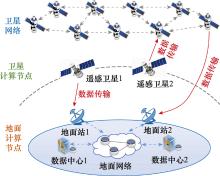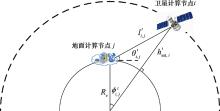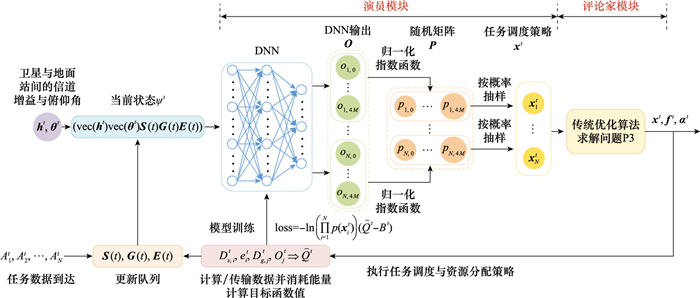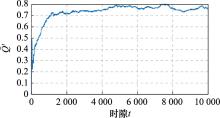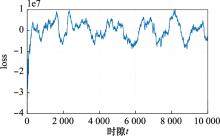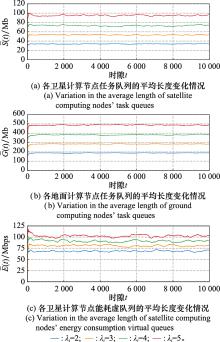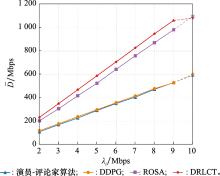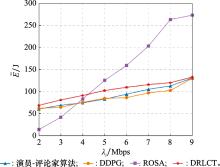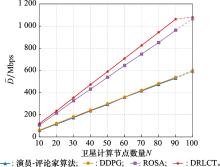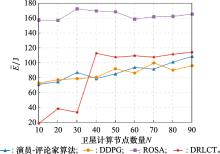Systems Engineering and Electronics ›› 2025, Vol. 47 ›› Issue (6): 1917-1929.doi: 10.12305/j.issn.1001-506X.2025.06.20
• Systems Engineering • Previous Articles Next Articles
Reinforcement learning task scheduling algorithm for satellite on-orbit processing
Linzhi MENG1,2,3, Xiaojuan SUN1,2,3,*, Yuxin HU1,2,3, Bin GAO1,2, Guoqing SUN1,2, Wenhao MU1,2
- 1. Aerospace Information Research Institute, Chinese Academy of Sciences, Beijing 100190, China
2. Key Laboratory of Technology in Geo-spatial Information Processing and Application System, Beijing 100190, China
3. School of Electronic, Electrical and Communication Engineering, University of Chinese Academy of Sciences, Beijing 100049, China
-
Received:2024-06-26Online:2025-06-25Published:2025-07-09 -
Contact:Xiaojuan SUN
CLC Number:
Cite this article
Linzhi MENG, Xiaojuan SUN, Yuxin HU, Bin GAO, Guoqing SUN, Wenhao MU. Reinforcement learning task scheduling algorithm for satellite on-orbit processing[J]. Systems Engineering and Electronics, 2025, 47(6): 1917-1929.
share this article
| 1 | LAI Z Q, WU Q, LI H W, et al. Orbitcast: exploiting mega-constellations for low-latency earth observation[C]//Proc. of the IEEE 29th International Conference on Network Protocols, 2021. |
| 2 |
ZHANG P , QIN Q , ZHANG S J , et al. Near real-time remote sensing based on satellite internet: architectures, key tech niques, and experimental progress[J]. Aerospace, 2024, 11 (2): 167.
doi: 10.3390/aerospace11020167 |
| 3 | 王龙河, 周一青, 曹欢, 等. 卫星互联网资源管控技术研究[J]. 中国工程科学, 2023, 25 (6): 27- 38. |
| WANG L H , ZHOU Y Q , CAO H , et al. Resource management and scheduling for satellite internet[J]. Strategic Study of Strategic Study of Computer Aided Engineering, 2023, 25 (6): 27- 38. | |
| 4 | CAON M, ROS P M, MARTINA M, et al. Very low latency architecture for earth observation satellite onboard data handling, compression, and encryption[C]//Proc. of the IEEE International Geoscience and Remote Sensing Symposium, 2021: 7791-7794. |
| 5 |
VINICIUS A D O , MARIE C , OBERLIN T , et al. Reduced-complexity end-to-end variational autoencoder for on board satellite image compression[J]. Remote Sensing, 2021, 13 (3): 447.
doi: 10.3390/rs13030447 |
| 6 |
LI Y J , WANG M , HWANG K , et al. LEO satellite constellation for global-scale remote sensing with on-orbit cloud AI computing[J]. IEEE Journal of Selected Topics in Applied Earth Observations and Remote Sensing, 2023, 16, 9369- 9381.
doi: 10.1109/JSTARS.2023.3316298 |
| 7 | 杨宁, 朱其星, 伍攀峰, 等. 星上遥感影像在轨处理进展研究[J]. 空间电子技术, 2023, 20 (4): 1- 8. |
| YANG N , ZHU Q X , WU P F , et al. Research on the progress of on-orbit processing of satellite remote sensing images[J]. Space Electronic Technology, 2023, 20 (4): 1- 8. | |
| 8 |
WANG S G , ZHANG Q Y , XING R L , et al. The first verification test of space-ground collaborative intelligence via cloud- native satellites[J]. China Communications, 2024, 21 (4): 208- 217.
doi: 10.23919/JCC.fa.2022-0422.202404 |
| 9 | SHEN Z S , JIN J , TAN C , et al. A survey of next-generation computing technologies in space-air-ground integrated networks[J]. ACM Computing Surveys, 2024, 56 (1): 1- 40. |
| 10 |
WANG S G , LI Q . Satellite computing: vision and challenges[J]. IEEE Internet of Things Journal, 2023, 10 (24): 22514- 22529.
doi: 10.1109/JIOT.2023.3303346 |
| 11 |
YAN J , BI S , ZHANG Y J , et al. Optimal task offloading and resource allocation in mobile-edge computing with inter-user task dependency[J]. IEEE Trans.on Wireless Communications, 2020, 19 (1): 235- 250.
doi: 10.1109/TWC.2019.2943563 |
| 12 |
BI S , ZHANG Y J . Computation rate maximization for wireless powered mobile-edge computing with binary computation offloading[J]. IEEE Trans.on Wireless Communications, 2018, 17 (6): 4177- 4190.
doi: 10.1109/TWC.2018.2821664 |
| 13 |
TRAN T X , POMPILI D . Joint task offloading and resource allocation for multi-server mobile-edge computing networks[J]. IEEE Trans.on Vehicular Technology, 2019, 68 (1): 856- 868.
doi: 10.1109/TVT.2018.2881191 |
| 14 | GUO S T, XIAO B, YANG Y Y, et al. Energy-efficient dynamic offloading and resource scheduling in mobile cloud computing[C]//Proc. of the 35th Annual IEEE International Conference on Computer Communications, 2016. |
| 15 |
TANG Q Q , FEI Z S , LI B , et al. Computation offloading in LEO satellite networks with hybrid cloud and edge computing[J]. IEEE Internet of Things Journal, 2021, 8 (11): 9164- 9176.
doi: 10.1109/JIOT.2021.3056569 |
| 16 |
CHEN J , XING H L , XIAO Z W , et al. A DRL agent for jointly optimizing computation offloading and resource allocation in MEC[J]. IEEE Internet of Things Journal, 2021, 8 (24): 17508- 17524.
doi: 10.1109/JIOT.2021.3081694 |
| 17 |
ALE L , ZHANG N , FANG X J , et al. Delay-aware and energy-efficient computation offloading in mobile-edge computing using deep reinforcement learning[J]. IEEE Trans.on Cognitive Communications and Networking, 2021, 7 (3): 881- 892.
doi: 10.1109/TCCN.2021.3066619 |
| 18 |
ZHANG S B , BAO S L , CHI K K , et al. DRL-based computation rate maximization for wireless powered multi-AP edge computing[J]. IEEE Trans.on Communications, 2024, 72 (2): 1105- 1118.
doi: 10.1109/TCOMM.2023.3325905 |
| 19 | XU J, YANG D J. Optimal task offloading for edge computing with stochastic task arrivals[C]//Proc. of the IEEE International Performance, Computing, and Communications Conference, 2023: 24-31. |
| 20 | 许斌, 赵云凯, 朱剑鸣, 等. 移动边缘计算不确定性任务持续卸载及资源分配方法[J]. 软件学报, 2024, 35 (3): 1466- 1484. |
| XU B , ZHAO Y K , ZHU J M , et al. Continuous offloading and resource allocation method of uncertain tasks in mobile edge computing[J]. Journal of Software, 2024, 35 (3): 1466- 1484. | |
| 21 | ZAKI A M, ELSAYED S A, ELGAZZAR K, et al. Heuristic-based proactive service migration induced by dynamic computation load in edge computing[C]//Proc. of the IEEE Global Communications Conference, 2022: 5668-5673. |
| 22 | NEELY M J . Stochastic network optimization with application to communication and queueing systems[M]. San Rafael: Morgan & Claypool Publishers, 2010. |
| 23 |
BI S Z , HUANG L , WANG H , et al. Lyapunov-guided deep reinforcement learning for stable online computation offloading in mobile-edge computing networks[J]. IEEE Trans.on Wireless Communications, 2021, 20 (11): 7519- 7537.
doi: 10.1109/TWC.2021.3085319 |
| 24 |
TANG Q Q , FEI Z S , LI B , et al. Stochastic computation offloading for LEO satellite edge computing networks: a learning-based approach[J]. IEEE Internet of Things Journal, 2024, 11 (4): 5638- 5652.
doi: 10.1109/JIOT.2023.3307707 |
| 25 | 付主木, 王俊朋, 司鹏举, 等. 基于李雅普诺夫随机优化的车辆边缘计算资源管理[J]. 控制与决策, 2022, 37 (3): 721- 728. |
| FU Z M , WANG J P , SI P J , et al. Resource management of vehicle edge computing based on Lyapunov stochastic optimization[J]. Control and Decision, 2022, 37 (3): 721- 728. | |
| 26 | 许驰, 唐紫萱, 金曦, 等. 基于李雅普诺夫优化和深度强化学习的多任务端边迁移[J]. 控制与决策, 2024, 39 (7): 2457- 2464. |
| XU C , TANG Z X , JIN X , et al. Multi-task end-edge offloading based on Lyapunov optimization and deep reinforcement learning[J]. Control and Decision, 2024, 39 (7): 2457- 2464. | |
| 27 | CHANG S , DENG S , WU Y H , et al. Online energy balancing strategy based on Lyapunov optimization in mobile crowdsensing[J]. IEEE Trans.on Industrial Informatics, 2023, 19 (9): 9266- 9279. |
| 28 | LIAO H J , ZHOU Z Y , ZHAO X W , et al. Learning-based queue-aware task offloading and resource allocation for space-air-ground-integrated power IoT[J]. IEEE Internet of Things Journal, 2021, 8 (7): 5250- 5263. |
| 29 | DAI Y Y , ZHANG K , MAHARJAN S , et al. Deep reinforcement learning for stochastic computation offloading in digital twin networks[J]. IEEE Trans.on Industrial Informatics, 2021, 17 (7): 4968- 4977. |
| 30 | MAO Y Y , ZHANG J , SONG S H , et al. Stochastic joint radio and computational resource management for multi-user mobile-edge computing systems[J]. IEEE Trans.on Wireless Communications, 2017, 16 (9): 5994- 6009. |
| 31 | WANG D Z , WANG W , KANG Y H , et al. Distributed data offloading in ultra-dense LEO satellite networks: a Stackelberg mean-field game approach[J]. IEEE Journal of Selected Topics in Signal Processing, 2023, 17 (1): 112- 127. |
| [1] | Libing JIANG, Qingwei YANG, Shuyu ZHENG, Zhuang WANG. Multi-orbit targets ISAR imaging resource allocation algorithm for netted radar based on auction theory [J]. Systems Engineering and Electronics, 2025, 47(1): 81-93. |
| [2] | Xianglin LIU, Chungang YANG, Fuqiang LI, Ying OUYANG, Yanbo SONG. Intent-driven data link network policy negotiation model and algorithm [J]. Systems Engineering and Electronics, 2024, 46(6): 2128-2137. |
| [3] | Hongkai KOU, Youhua FU. Resource optimization of STAR-RIS assisted multicarrier integrated sensing and communication systems [J]. Systems Engineering and Electronics, 2024, 46(4): 1431-1439. |
| [4] | Zekun YAO, Chao WANG, Qingzhan SHI, Shaoqing ZHANG, Naichang YUAN. Cooperative jamming resource allocation model for radar network based on improved discrete simulated annealing genetic algorithm [J]. Systems Engineering and Electronics, 2024, 46(3): 824-830. |
| [5] | Yuting ZHANG, Jingyu YANG. Capability-based defense resource allocation method [J]. Systems Engineering and Electronics, 2024, 46(2): 599-604. |
| [6] | Shihao LIU, Yangchao HUANG, Hang HU, Jiangbo SI, Huizhu HAN, Qi AN. Joint optimization of task offloading and resource allocation for UAV swarm-assisted edge computing systems [J]. Systems Engineering and Electronics, 2024, 46(2): 751-760. |
| [7] | Dejiang LU, Xing WANG, You CHEN, Xing HU. Adaptive scheduling method of joint multi-resource for cooperative interference of networked radar system [J]. Systems Engineering and Electronics, 2023, 45(9): 2744-2754. |
| [8] | Runnan QIN, Wenming XIE, Jianjiang HUI, Xiaodong PENG, Yun LI. Task scheduling microservice strategy for space manipulation simulation [J]. Systems Engineering and Electronics, 2023, 45(5): 1391-1398. |
| [9] | Yaohua XU, Huiping WANG, Guizhu WANG, Chenglong ZHU, Mengqin DING, Fang JIANG, Yi WANG. Resource allocation algorithm for internet of vehicles based on graph coloring and three-dimensional matching [J]. Systems Engineering and Electronics, 2023, 45(3): 869-875. |
| [10] | Siqi TANG, Zhisong PAN, Guyu HU, Yang WU, Yunbo LI. Application of deep reinforcement learning in space information network——status quo and prospects [J]. Systems Engineering and Electronics, 2023, 45(3): 886-901. |
| [11] | Han CHEN, Jing ZHANG, Jun DONG, Jie DONG. MEC offloading scheme based on joint optimization of subtaskscheduling and delay [J]. Systems Engineering and Electronics, 2023, 45(2): 572-579. |
| [12] | Bozhi DONG, Jiang ZHU, Haibo ZHANG. SCMA-based energy efficiency resource allocation scheme in amplify-forward relay system [J]. Systems Engineering and Electronics, 2022, 44(6): 2035-2042. |
| [13] | Hong ZOU, Chenyang BAI, Peng HE, Yaping CUI, Ruyan WANG, Dapeng WU. Edge service placement strategy based on distributed deep learning [J]. Systems Engineering and Electronics, 2022, 44(5): 1728-1737. |
| [14] | Yuanyuan ZHANG, Yang GAO, Peng ZHU, Jintao LIU, Shushan GU. UAV reconnaissance tactical planning based on colored Petri nets [J]. Systems Engineering and Electronics, 2022, 44(3): 900-907. |
| [15] | Shanxue CHEN, Shengjin WU, Bowen GU. Energy efficiency optimization algorithm for uplink NOMA systems with time reversal [J]. Systems Engineering and Electronics, 2022, 44(3): 1007-1013. |
| Viewed | ||||||
|
Full text |
|
|||||
|
Abstract |
|
|||||
